

The "15-minute law": Past, Present & Future. January 1st, 2014, it would seem as though the Taxi Commissions have won.
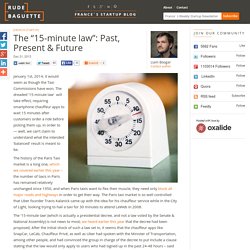
The dreaded ’15-minute law’ will take effect, requiring smartphone chauffeur apps to wait 15 minutes after customers order a ride before picking them up, in order to — well, we can’t claim to understand what the intended ‘balanced’ result is meant to be. The history of the Paris Taxi market is a long one, which we covered earlier this year - the number of taxis in Paris has remained relatively unchanged since 1950, and when Paris taxis want to flex their muscle, they need only block all major roads and highways in order to get their way. The Paris taxi market is so well controlled that Uber founder Travis Kalanick came up with the idea for his chauffeur service while in the City of Light, looking trying to hail a taxi for 30 minutes to attend LeWeb in 2008.
No, whenever there’s a chance for the international community to chime in about what France is & isn’t, you can always count on them to do exactly that. Uber to tackle urban ridesharing, launches UberPop in Paris. Uber announced today via their blog that they will launch on February 5th UberPop, an urban ridesharing service that will undercut UberX prices by nearly 50%.
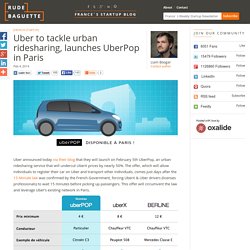
The offer, which will allow individuals to register their car on Uber and transport other individuals, comes just days after the 15-Minute law was confirmed by the French Government, forcing UberX & Uber drivers (licenses professionals) to wait 15 minutes before picking up passengers. This offer will circumvent the law and leverage Uber’s existing network in Paris. Comme Google, Uber veut aussi concevoir une voiture sans conducteur. Travis Kalamick ne l'a jamais caché: le futur d'Uber passera peut-être par les voitures sans conducteur.
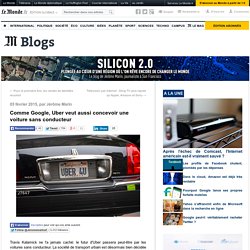
La société de transport urbain est désormais bien décidée à passer à la vitesse supérieure. Lundi 2 février, elle a officialisé un partenariat avec la prestigieuse université de Carnegie Mellon, notamment connue pour ses travaux en matière de robotique et de technologies autonomes. Et un milliard de dollars supplémentaires pour Uber ! Visiblement, les 3,4 milliards de dollars levés au cours des deux derniers mois n'étaient pas suffisants pour satisfaire les ambitions de conquête de Travis Kalanick, le fondateur et patron d'Uber.
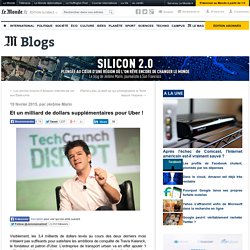
Uber va lancer un service de livraison le jour même. Travis Kalanick n'a jamais caché ses ambitions : le transport de passagers n'est qu'une première étape pour Uber.
L'entrepreneur veut utiliser sa plate-forme technologique pour réinventer la logistique urbaine. C'est pour cela que la jeune société multiplie les expérimentations. From Zipcar to the Sharing Economy. Avis has taken an interesting (and bold) step by acquiring Zipcar, absorbing an innovative but struggling competitor at what is likely to be seen as a bargain price while acquiring a small but desirable customer base and gaining a foothold in the rapidly growing world of collaborative consumption.

Sadly, the Zipcar culture may not survive the merger. But in the world of new “sharing economy” models that generate efficiency gains, theirs is just the tip of the iceberg. True, they pioneered the creative use of technology to open up flexible new ways of renting a car. Uber + Airbnb. Uber Deck Reveals Revenue, Rides, Drivers and Fares. The Difference Between Uber and Airbnb. Uber and Airbnb have a lot in common: They are the tech startup darlings of the moment, they are valued in the tens of billions of dollars and make significant revenue, they connect the convenience of the Internet to the online world, they are unpopular all over the world with incumbents and regulators and they exist by virtue of the non-employees who do the real work of renting their homes and driving their cars.
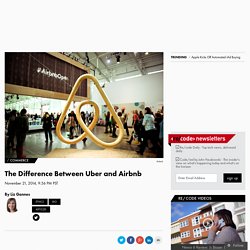
The moment I learned just how far Uber will go to silence journalists and attack women. By Sarah Lacy On November 17, 2014 A big debate among the Pando staff for the past two years has been over just how morally bankrupt Uber is.
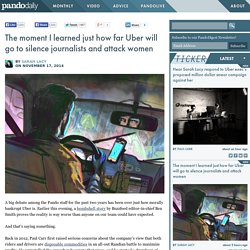
Earlier this evening, a bombshell story by Buzzfeed editor-in-chief Ben Smith proves the reality is way worse than anyone on our team could have expected. And that’s saying something. Back in 2012, Paul Carr first raised serious concerns about the company’s view that both riders and drivers are disposable commodities in an all-out Randian battle to maximize profits. He uninstalled the app when he wrote that piece, and he started a drumbeat of press around these concerns.
What Airbnb Gets About Culture that Uber Doesn’t. Last week, as Uber battled a media firestorm after a senior executive talked of investigating unfriendly journalists and a company manager actually used its “God View” feature to track the comings and goings of a reporter, Airbnb welcomed more than 1,500 of its most productive providers to its first-ever host convention, an immersive celebration one expert attendee likened to a Mary Kay event.

The happy #AirbnbOpen sentiment of gift-wrapped programs, food drives, and a new company logo that doubles as a swing filled my Twitter stream, painting a stark contrast to the cynicism of the dystopian #ubergate tweets. The contrast was especially striking given that Airbnb and Uber are together inventing a new organizational form: platforms that are firm-market hybrids, supplying branded service offerings without actually employing the providers or owning the assets used in provision. These two flagship platforms of the sharing economy are remarkably similar in many ways.